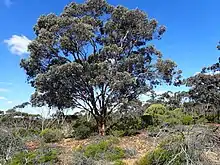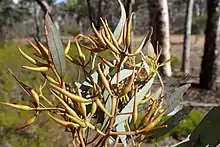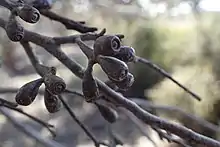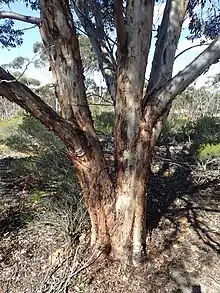Eucalyptus densa
Eucalyptus densa is a species of mallee or mallet that is endemic to Western Australia. It has smooth greyish bark that is shed in curly strips, linear to narrow lance-shaped adult leaves, long, spindle-shaped flower buds in groups of seven or nine, pale yellow or lemon-coloured flowers and conical, cylindrical or barrel-shaped fruit.
| Eucalyptus densa | |
|---|---|
 | |
| Eucalyptus densa growing south of Tarin Rock | |
| Scientific classification | |
| Kingdom: | Plantae |
| Clade: | Tracheophytes |
| Clade: | Angiosperms |
| Clade: | Eudicots |
| Clade: | Rosids |
| Order: | Myrtales |
| Family: | Myrtaceae |
| Genus: | Eucalyptus |
| Species: | E. densa |
| Binomial name | |
| Eucalyptus densa | |



Description
Eucalyptus densa is a mallee or a mallet that typically grows to a height of 1–12 m (3 ft 3 in – 39 ft 4 in) and does not form a lignotuber. It has smooth. pale grey to cream-coloured bark that is shed in curly flakes. Its adult leaves are the same dull greyish green on both sides, linear to narrow lance-shaped, 40–90 mm (1.6–3.5 in) long and 4–10 mm (0.16–0.39 in) wide on a petiole 5–12 mm (0.20–0.47 in) long. The flower buds are arranged in leaf axils in groups of seven or nine on an unbranched peduncle 12–20 mm (0.47–0.79 in) long, the individual buds on a pedicel 3–6 mm (0.12–0.24 in) long. Mature buds are shaped like a long spindle, 17–35 mm (0.67–1.38 in) long and 3–5 mm (0.12–0.20 in) wide with a horn-shaped operculum about four times as long as the floral cup. Flowering occurs between January and February or May to September and the flowers are pale yellow or lemon coloured. The fruit is a woody conical, cylindrical or barrel-shaped capsule with the valves near rim level.[2][3][4]
Taxonomy and naming
Eucalyptus densa was first formally described in 1991 by the botanists Ian Brooker and Stephen Hopper and the description was published in the journal Nuytsia.[4][5] The specific epithet (densa) is a Latin word meaning "thick", "close" or "compact",[6]: 790 referring to crown of this species.[3]
Brooker and Hopper also described two subspecies and the names have been accepted by the Australian Plant Census:
- Eucalyptus densa subsp. densa[7][8] - a short-trunked mallet with a dense crown, often to ground level;[4]
- Eucalyptus densa subsp. improcera[9][10] - a mallee up to 3 m (9.8 ft) tall with slender stems.[4]
The subspecies name improcera is a Latin word meaning "short" or "undersized",[6]: 708 referring to its stature compared to subspecies densa.[4]
Distribution and habitat
This eucalypt is found on ridges, flats and drainage line areas of the southern Wheatbelt and Goldfields-Esperance regions of Western Australia where it grows in clay, loam, sandy or lateritic soils.[2] Subspecies densa is found between Ongerup, Ravensthorpe and Hyden and subspecies improcera in the Ravensthorpe and Jerramungup areas.[8][10]
Conservation status
Both subspecies of E. densa are classified as "not threatened" by the Western Australian Government Department of Parks and Wildlife.[8][10]
See also
References
- "Eucalyptus densa". Australian Plant Census. Retrieved 29 May 2019.
- "Eucalyptus densa". FloraBase. Western Australian Government Department of Biodiversity, Conservation and Attractions.
- "Eucalyptus densa subsp. densa". Euclid: Centre for Australian National Biodiversity Research. Retrieved 4 June 2020.
- Brooker, M. Ian H.; Hopper, Stephen (1991). "A taxonomic revision of Eucalyptus wandoo, E. redunca and allied species (Eucalyptus series Levispermae Maiden - Myrtaceae) in Western Australia". Nuytsia. 8 (1): 149–155. Retrieved 29 May 2019.
- "Eucalyptus densa". APNI. Retrieved 29 May 2019.
- Brown, Roland Wilbur (1956). The Composition of Scientific Words. Washington, D.C.: Smithsonian Institution Press.
- "Eucalyptus densa subsp. densa". Australian Plant Census. Retrieved 29 May 2019.
- "Eucalyptus densa subsp. densa". FloraBase. Western Australian Government Department of Biodiversity, Conservation and Attractions.
- "Eucalyptus densa subsp. improcera". Australian Plant Census. Retrieved 29 May 2019.
- "Eucalyptus densa subsp. improcera". FloraBase. Western Australian Government Department of Biodiversity, Conservation and Attractions.